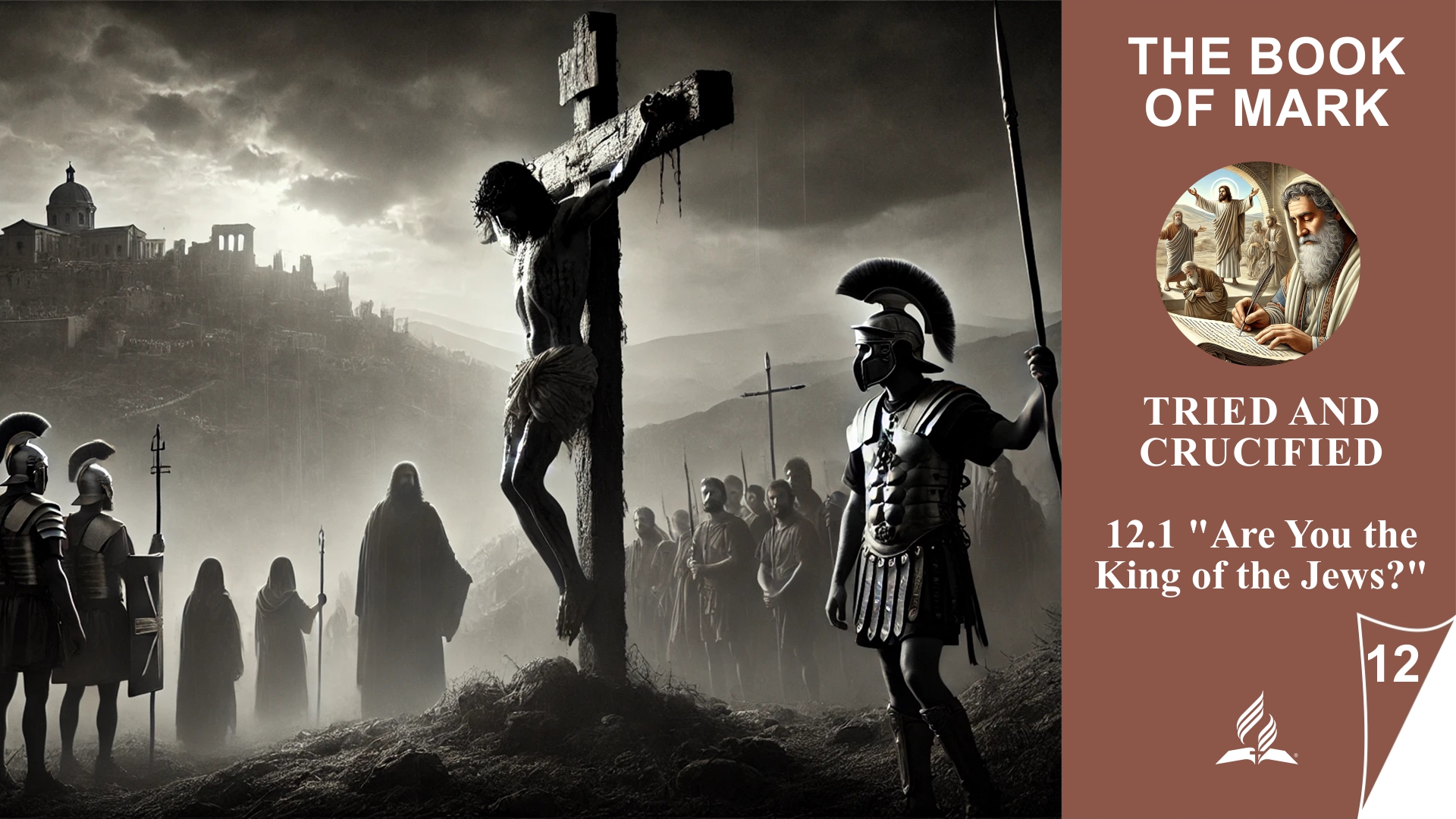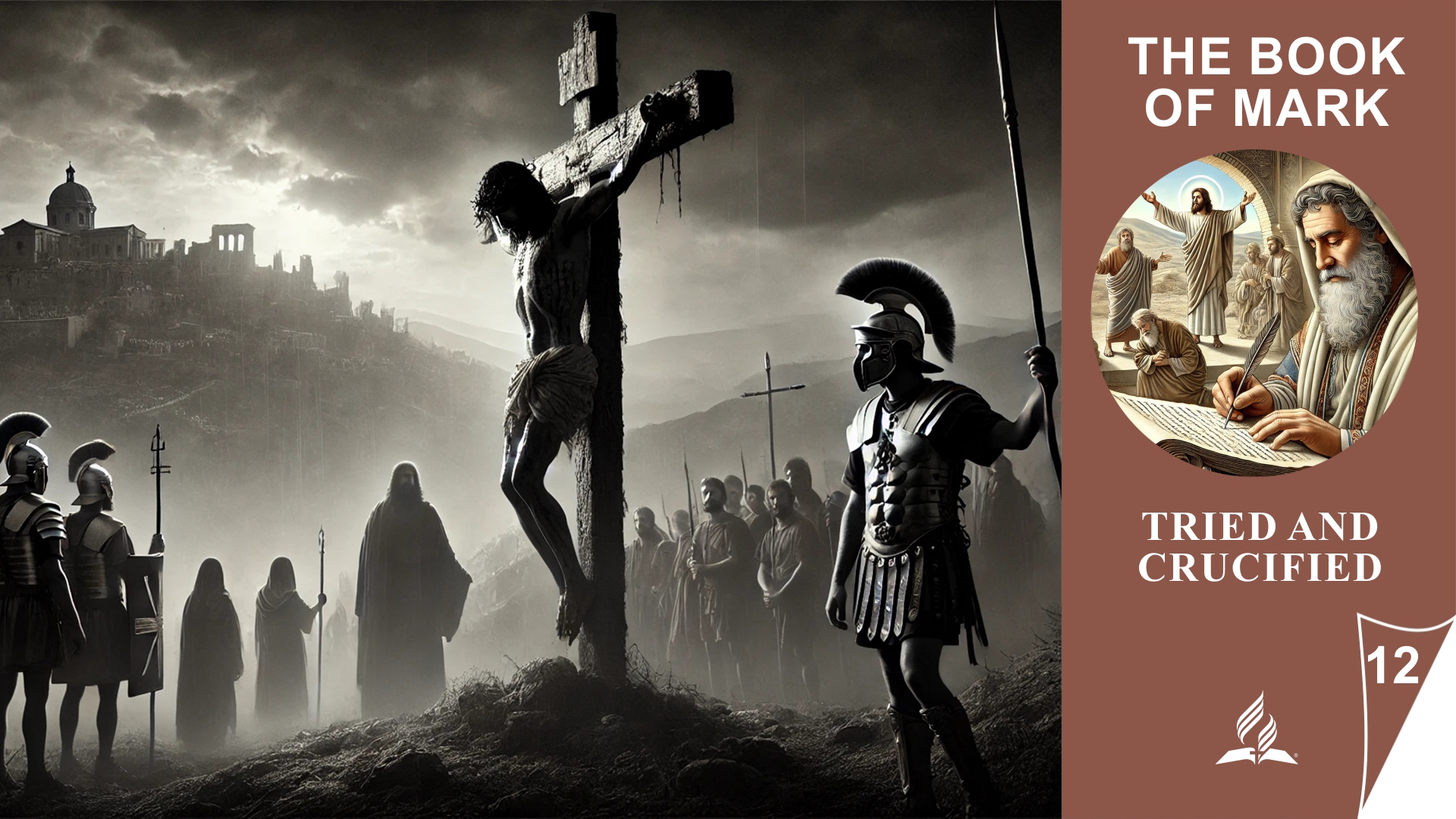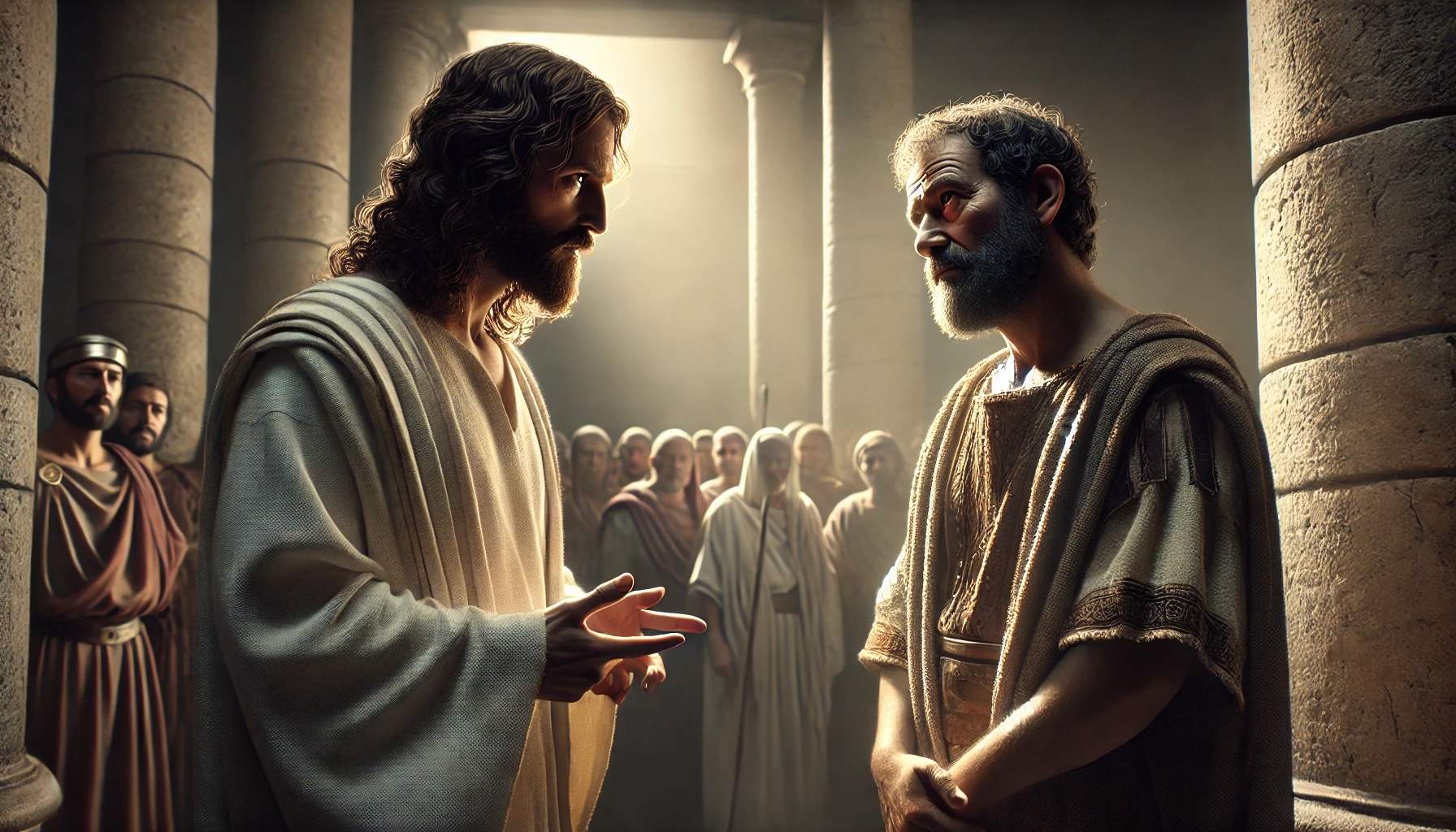


Lesson 12.Tried and Crucified
The Court and the Cross: Jesus’ Sacrifice and the Fulfillment of Redemption
Lesson 12 leads us into the deepest and simultaneously most meaningful moments of Jesus’ Passion narrative. From His condemnation by Pilate to the crucifixion and burial, we experience the heart of the Christian faith: Jesus’ sacrifice on the cross. The events of these final hours are marked by painful irony, as the one who is mocked and ridiculed is, in fact, the true King and Savior of the world. In this lesson, we see how God’s plan of redemption is fulfilled through the suffering and death of His Son. Jesus’ crucifixion is not merely a cruel event but the key to reconciliation between God and humanity. This lesson challenges us to understand the depth of this sacrifice and to reflect on what Jesus’ death and resurrection mean for our faith and daily lives.
12.1 “Are You the King of the Jews?”
The Bitter Irony of the King of the Jews: The True Messiah Before the Court
Read Mark 15:1–15. What ironic situations are present here?
In the passage Mark 15:1–15, several ironic situations become evident, highlighting the complexity and profound significance of the events surrounding Jesus’ condemnation. The central question, “Are you the King of the Jews?” not only serves as the accusation against Jesus but also reveals the deep irony of His trial and execution.
-
Jesus’ Dual Identity: Messiah and King Jesus is referred to both as the Messiah (“Anointed One”) and the “King of the Jews.” In the Old Testament, the kings of Israel were anointed, emphasizing their divine calling and legitimacy. However, the religious leaders twist this designation by interpreting Jesus’ claim to kingship as rebellion against Roman authority. This distortion highlights the irony that the true King and Savior are neither recognized nor acknowledged as such but are instead perceived as a threat.
-
Pontius Pilate’s Dilemma and Irony Pontius Pilate, the Roman governor, recognizes Jesus’ innocence and true identity but finds himself in an ironic situation. Although he knows that Jesus is not a rebel in the traditional sense, he feels compelled to fulfill the demands of the Jewish leaders and the agitated crowd to maintain order. The irony lies in the fact that Pilate, despite his attempts to administer justice, ultimately contributes to the condemnation of the innocent King.
-
Jesus’ Royal Behavior Jesus’ response to Pilate, “You say so” (Mark 15:2), is deeply significant and underscores His royal dignity. Instead of rejecting the title or accepting it to directly confront Roman authority, Jesus remains serenely calm and detached. This reaction suggests that His kingship is of a different kind—spiritual rather than political. This contrasts with people’s expectations of an earthly and powerful king.
-
The Role of the Crowd and Religious Leaders Pilate offers the crowd a choice between releasing a prisoner during Passover and condemning Jesus. Although Pilate might ironically suggest releasing Jesus, the true irony is that his decision ultimately benefits the religious leaders, who lacked the authority to execute Jesus themselves. This manipulation by the leaders results in the true sacrifice—Jesus being condemned, despite Him being the source of redemption.
-
The Tragic Irony of the Crucifixion The crucifixion of Jesus as the “King of the Jews” is the ultimate irony. While religious and worldly powers attempt to humiliate and destroy Jesus, His death accomplishes the central act of Christian redemption. The ironic twist is that the conspirators inadvertently advance the divine work of salvation through their actions.
Conclusion The episode “Are you the King of the Jews?” is rich in ironic elements that highlight the profound theology and prophetic fulfillment in the events surrounding Jesus’ death. The irony that the true King and Messiah are condemned through false accusations and political machinations underscores the tragedy and divine purpose of this historical event. Jesus’ calm acceptance of His fate and His true royal nature are fully recognized and honored only in light of subsequent events and the resurrection.
What Can Prevent Someone from Following the Crowd When the Pressure Is Great?
Several factors can prevent someone from following the crowd, even under significant pressure. Here are some key considerations:
-
Strong Personal Beliefs and Values Individuals with clear moral or ethical principles can remain steadfast in situations of peer pressure. They know what is right or wrong for them and are less likely to be swayed by external influences.
-
Critical Thinking The ability to critically assess situations and decisions helps recognize and resist mass pressure. People who carefully weigh their own decisions and do not blindly follow the majority are more likely to follow their own path.
-
Self-Confidence Knowing oneself and one’s strengths makes a person less influenced by others’ opinions or expectations. A strong sense of self-worth enables independent action without being swept up by the crowd.
-
Sense of Responsibility Some individuals understand that they are accountable for their actions. They realize that following the crowd can lead to unwanted consequences and thus make more deliberate decisions.
-
Mental and Emotional Independence People who are emotionally and mentally secure are less afraid of rejection or isolation. They have less need for approval from the crowd and are more likely to act based on their own convictions.
-
Role Models or Guidance Sometimes, a role model—whether a friend, family member, or historical figure—provides the courage to go against the tide. A strong role model can demonstrate that it is possible to stay true to one’s principles even in difficult circumstances.
-
Trust in Long-Term Consequences Individuals who think long-term understand that short-term rewards or group acceptance are often less valuable than the long-term benefits of integrity and self-faithfulness.
In Summary: A combination of inner strength, clarity of personal values, and the ability to recognize long-term impacts can prevent someone from succumbing to crowd pressure.
The connection of this episode to our everyday lives and faith lies in how we respond in moments of external pressure and societal expectations. The story in Mark 15:1–15 challenges us to recognize the true character and identity of Jesus, even when the majority—in this case, the religious leaders and the crowd—are against Him. This situation can easily be mirrored in our own lives when we face similar challenges.
-
The Power of Faith in Daily Life The scene where Jesus stands before Pilate reminds us that our faith often places us in situations where we must swim against the current. Jesus knew who He was—the true King and Messiah—and despite all slanders and false accusations, He held firmly to His identity and mission. In daily life, our faith can give us the strength to remain steadfast even when society or our environment upholds different values and priorities.
-
Decisions Under Pressure Pilate’s decision to hand Jesus over to the crowd demonstrates how peer pressure can influence even those who understand what is right. Similarly, we often face pressure to meet others’ expectations, whether in work, school, or social settings. Our faith reminds us not to blindly follow the crowd but to stay true to our values and convictions, even when it is challenging.
-
The Role of Irony in Our Faith The irony in the story is that those who mocked Jesus as the “King of the Jews” did not recognize Him as the true King and Messiah. Similarly, in daily life, it can be ironic when people misunderstand or ridicule God’s ways or our faith-based decisions. However, through faith, we know that God’s truths and plans often transcend what the majority perceives.
-
Inner Strength and Independence Just as in daily life, this story shows that inner strength and independence are required to resist being swept away by the crowd. Jesus remained calm and composed despite false charges and the crowd’s cries against Him. His behavior challenges us to hold onto our beliefs in moments of external pressure, drawing strength from our faith and trust in God’s plan.
-
Long-Term Perspective in Faith Jesus’ acceptance of His fate and His understanding of the divine plan remind us that faith requires a long-term perspective. The immediate consequences of standing firm or resisting group pressure can be painful, as was Jesus’ crucifixion. However, the resurrection and redemption demonstrate that God’s plan finds fulfillment in eternity. In daily life, this encourages us to endure short-term difficulties, trusting in the long-term rewards that faith brings.
Conclusion: The episode “Are you the King of the Jews?” urges us to rely on our faith when confronted with pressure and challenges. It reminds us that true greatness and truth are often invisible to the crowd and that the path of faith sometimes means standing alone to fulfill the true divine calling.
True strength often manifests in silent perseverance, even when the world around us loudly opposes.
Visited 79 times, 1 visit(s) today









